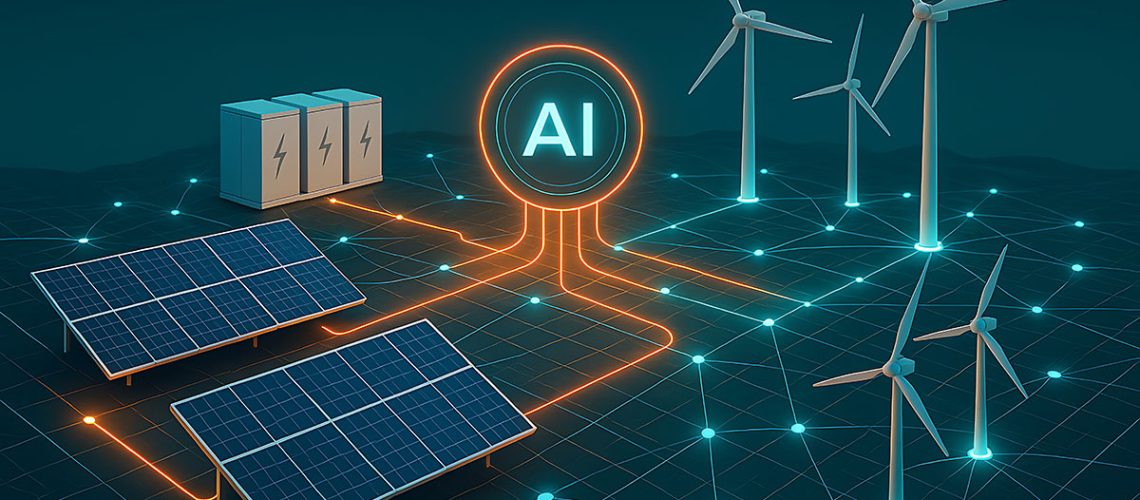Over the past decade, we’ve seen an incredible shift in how we think about energy—where it comes from, how we use it, and how we can make it more sustainable. As someone who’s worked in the renewable energy sector for years, I’ve watched solar technology evolve from a promising alternative to a central pillar of the UK’s clean energy strategy. But there’s a new player supercharging that evolution: Artificial Intelligence (AI).
The integration of AI into solar energy is no longer just a buzzword—it’s a game-changer. From improving the efficiency of solar panels to optimising grid performance, AI is making solar smarter, more reliable, and far more adaptive to the complexities of real-world energy demand.
Why AI Is the Perfect Partner for Solar
At its core, solar energy is clean, renewable, and increasingly affordable. But it’s not without its challenges—namely, its variability. The sun doesn’t shine consistently, and clouds, seasons, and geography all play a role in how much power we can generate. That’s where AI comes in.
Artificial Intelligence excels at pattern recognition and prediction. It can analyse weather patterns, energy consumption data, and panel performance metrics to make real-time adjustments and accurate forecasts. This kind of intelligent decision-making helps eliminate guesswork, allowing solar systems to operate at peak efficiency—even in the face of unpredictable conditions.
Smarter Panels, Smarter Systems
One of the most exciting developments I’ve seen recently is the use of AI in predictive maintenance and fault detection. In traditional systems, a drop in performance might go unnoticed until a technician conducts a manual check. With AI, sensors and algorithms monitor every component of a solar installation in real-time. If something’s not working correctly—whether it’s a dusty panel or a failing inverter—the system flags it immediately, often before it becomes a serious issue.
This kind of proactive maintenance significantly reduces downtime and repair costs. More importantly, it increases the long-term return on investment for both residential users and commercial developers, making solar an even more attractive proposition across the UK.
Energy Forecasting: Meeting Demand with Precision
Energy forecasting is another area where AI is pushing boundaries. By analysing historical data and incorporating live weather information, AI models can accurately predict how much energy a solar installation will produce over the coming hours or days. This is crucial for balancing energy supply with demand on the grid.
In the past, unpredictability has been a sticking point for renewables. Now, with AI-driven forecasting, grid operators can integrate solar more effectively and avoid overloading or underutilising other energy sources. It’s a big win for efficiency and for the stability of the national energy system.
AI and the Rise of Energy Independence
There’s also a growing movement toward decentralised energy—think rooftop solar paired with home batteries. AI is playing a pivotal role here, managing when to store power, when to use it, and when to sell it back to the grid. For homeowners, this means greater control over energy usage and bills. For the environment, it means less reliance on fossil fuels and a more resilient grid.
I’ve spoken with families and businesses who, thanks to AI-enhanced solar systems, have significantly reduced their carbon footprints while saving money. It’s proof that when we combine cutting-edge tech with a commitment to sustainability, we get solutions that are both practical and powerful.
Transforming the Solar Workforce
Let’s not forget the impact AI is having on the human side of the industry. From engineering to customer service, AI tools are helping solar companies operate more efficiently. Design software powered by AI can recommend panel placement based on aerial imagery and shading analysis. Chatbots and virtual assistants are handling routine customer inquiries. These innovations free up human workers to focus on higher-level tasks and more meaningful interactions.
That said, the shift to AI does require upskilling. As a leader in this space, I believe we have a responsibility to ensure our workforce is equipped to work alongside these technologies. This includes training new technicians in AI-enhanced systems and offering continuing education for seasoned professionals.
The Road Ahead
We’re still in the early stages of AI’s integration into solar, but the momentum is undeniable. As costs come down and technology becomes more accessible, I expect we’ll see even broader adoption across the UK—from major commercial solar farms to individual households in rural villages.
The synergy between solar and AI represents more than just technological progress—it’s a step toward a cleaner, smarter, and fairer energy future. We have the tools to build an energy system that’s not only sustainable but also intelligent, responsive, and inclusive.
As someone who’s always championed innovation in clean energy, I find this moment incredibly inspiring. AI is not here to replace human ingenuity—it’s here to enhance it. Together, we can harness both the power of the sun and the precision of machine learning to create energy systems that serve us all better.
Conclusion
The fusion of solar energy and Artificial Intelligence is one of the most promising developments in the push for a greener UK. From maximising panel efficiency to predicting energy output with uncanny accuracy, AI is changing how we produce, consume, and think about solar power.
As we continue to embrace this technology, we must also invest in education, infrastructure, and inclusive policy to ensure that everyone can benefit from this smart energy revolution. With thoughtful implementation and continued collaboration, the UK can lead the world in building an energy future that’s as intelligent as it is sustainable.
And if there’s one thing I’ve learned throughout my career, it’s this: the future belongs to those who innovate with purpose. At this intersection of AI and solar energy, we’ve got a golden opportunity—and we should seize it.
